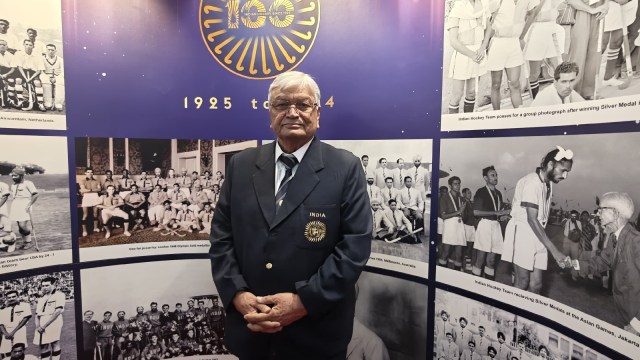Pritish Raj works with sports team at The Indian Express' and is based out of New Delhi. ... Read More
© The Indian Express Pvt Ltd
- Tags:
- Dhyan Chand
- Hockey India
Latest Comment
Post Comment
Read Comments
 Aslam Sher Khan’s (in picture) father Ahmed Sher Khan, was there on the Indian bench, part of India's third consecutive Olympic gold medal team and the last to win before Independence. (Express photo | Pritish Raj)
Aslam Sher Khan’s (in picture) father Ahmed Sher Khan, was there on the Indian bench, part of India's third consecutive Olympic gold medal team and the last to win before Independence. (Express photo | Pritish Raj)August 15, 1936. A wounded Dhyan Chand removed his spiked shoes and stockings at halftime, stepped back onto the waterlogged Berlin pitch barefoot, and proceeded to dismantle the German hockey team in front of 20,000 spectators and Adolf Hitler himself.
For Aslam Sher Khan, 1975 Hockey World Cup winner, this wasn’t just folklore — it was family history. His father, Ahmed Sher Khan, was there on the Indian bench, part of India’s third consecutive Olympic gold medal team and the last to win before Independence.
On Friday, as the centenary celebrations of Indian hockey took place at the Dhyan Chand Stadium in New Delhi, Aslam was fixated on the 1936 gold medal-winning team picture, recalling the stories he grew up listening to from his father.
The 1936 Olympics have a special, mythical significance in Indian hockey’s 100-year history. “The 1936 Olympics were a crazy one as compared to others. My father would term it as ‘voltage’ and tell me that Germany wanted to show the world that they are superior and hosting the Olympics was one of the ways of exerting that soft power,” Khan told The Indian Express.
 The 1936 gold medal-winning hockey team picture. (Hockey India)
The 1936 gold medal-winning hockey team picture. (Hockey India)
India were headed into the Berlin Games on the back of two consecutive gold medals, at the 1928 Amsterdam and 1932 Los Angeles Olympics. Favourites to complete the hat-trick, India’s title defence didn’t start exactly as planned.
The star-studded team, which had Dhyan Chand as the captain and the likes of Sayed Jaffar, Edward Goodsir-Cullen, Roop Singh, Ahmed Sher Khan, Carlyle Tapsell and Mirzapur Masood, lost 1-4 to Delhi XI in a practice match before leaving the country.
“The team dismissed the early loss as they knew the side was too strong to take on anyone. But when India reached Germany, the team lost a warm-up game to a German XI, 4-1,” said Khan. “My father said that the loss hit a nerve among his teammates and they decided to fully commit to the game with strict meals and bedtime routine in that era when the concept of workload management didn’t even exist.”
The Indian team bulldozed past Hungary, the United States and Japan in the group stage, defeating them 4-0, 7-0, and 9-0, respectively. Similarly, Germany won their group with wins over Afghanistan and Denmark. In the semi-final, India decimated France 10-0 and set up a final with the hosts, Germany.
“The final and its build-up were unusual. Both teams were supposed to play on 14th August, but due to incessant rain, the final was postponed. A lot of fans who had come to witness the final stayed around the stadium as they couldn’t head back home,” Khan said.
The final had everything, from players adapting to the damp ground to Dhyan Chand losing his tooth in a collision with German goalkeeper Tito Warnholtz. The Germans looked determined to end India’s stranglehold.
A report in The Hindu on August 16, 1936, noted: “Germany, in particular, were all earnestness and determination to have the single honour of beating the champion nation, having the advantage of their own grounds and climate. A proof of their determination is afforded by the fact the German team, which played the final, had assiduous practice together for the last two years.”
The stadium was full, with an article in the Malaya Tribune stating the attendance count was 20,000 while a Reuters report in The Indian Express said, “the stadium was filled to its capacity.”
The Indians dazzled the crowd and barely let the Germans trouble themselves, scoring eight goals and conceding just one. “There are so many myths about that final, like Dhyan Chand scoring six goals, some mention he scored four goals. But in reality, he scored three goals, and Ali Dara scored two goals. Roop Singh, Tapsell and Jaffar had one goal each,” Khan said.
Dhyan Chand himself clarified in the days after the final that he scored three goals.
However, one story that Khan said is true about the final is that Dhyan Chand removed his stockings and spiked shoes in the second half and became speedier. “Such was the class of the man. One of the reasons he is the greatest is that, apart from skills, he was the student of the game who knew what to do in different situations. Knowing that the ground was damp, he improvised, and India scored seven goals once he did that,” recalled Khan.
Pointing at the picture on display at the stadium named after the sport’s all-time great, Khan sighed and said, “All they gave us in legacy was commitment, and we tried our best to honour it.”